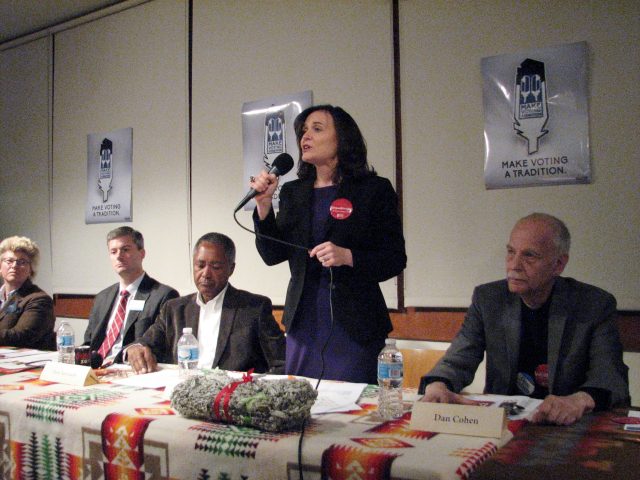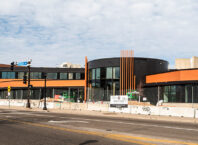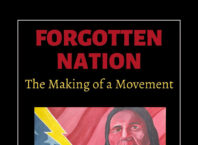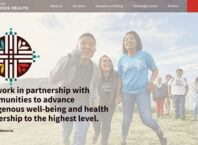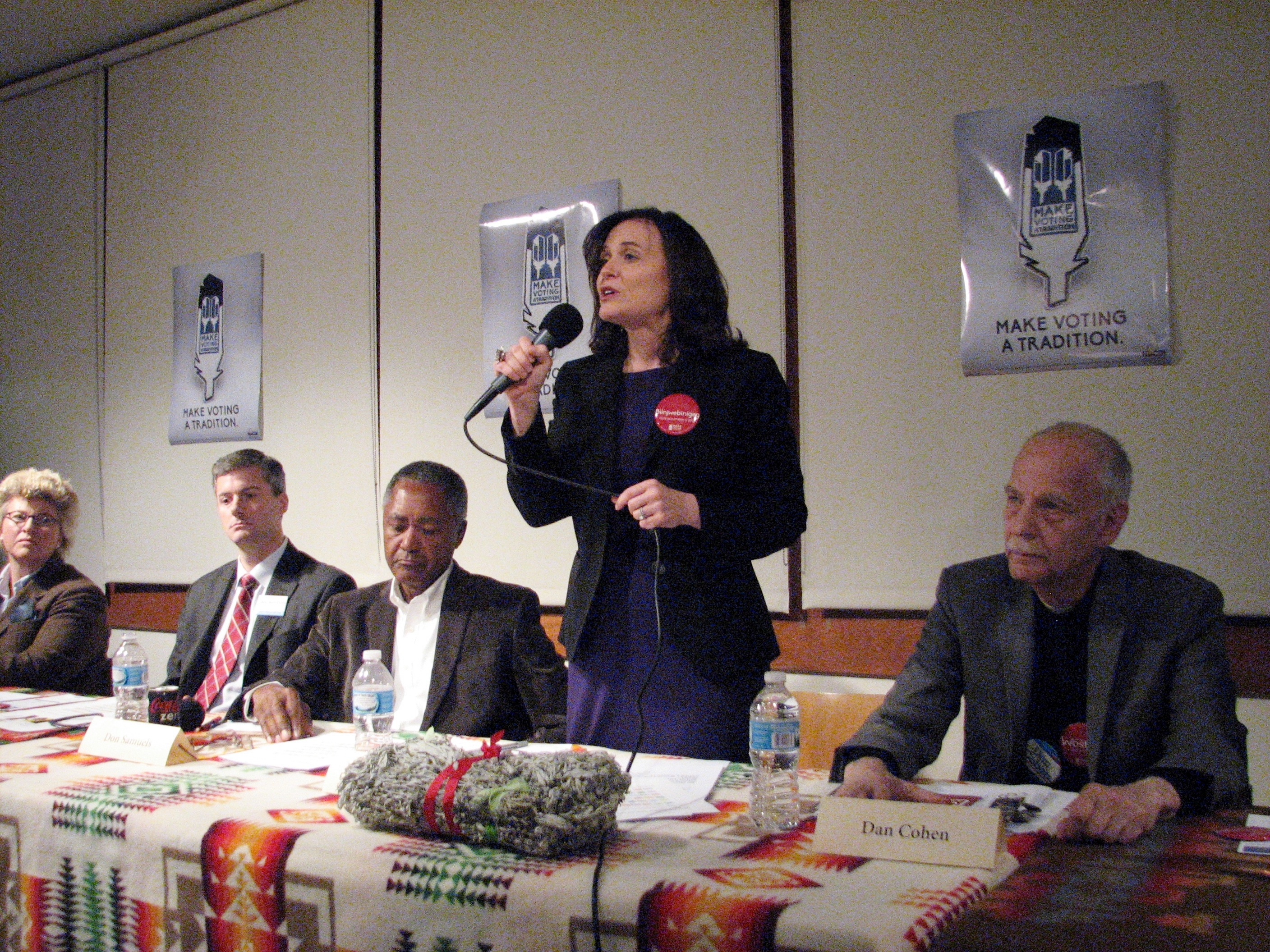 The Native American Community
The Native American Community
Development Institute sought to engage Native American voters in the
city’s mayoral race with its inaugural Minneapolis American Indian
Mayoral Forum on Oct. 17 hosted at All My Relations Gallery.
Candidates for the city’s highest
office included Jackie Cherryhomes, Dan Cohen, Bob Fine, Betsy
Hodges, Don Samuels, Cam Winton and Stephanie Woodruff. Noticeably
absent was Mark Andrew, who sent a representative from his campaign
to read a prepared statement. In his place, event organizers allowed
Merrill Anderson to take part in the forum, a first according to the
candidate.
Opening statements staked out the
positions of most of the candidates on issues, from qualifications
for office to personal stories and broader visions for the city’s
future.
Cherryhomes said her goal was, “to
build one city that treats us with respect and dignity.” Citing
affordable housing and employment disparities in the African American
and Native communities, she described her campaign for mayor as a
race to leave the city a better place for her daughter and that she
would, “look at everything through the eyes of justice and
equality.”
Fine characterized his involvement in
government as a strong point in his candidacy, serving 16 years on
the Minneapolis Parks Commission, two years on the zoning board and
as the longest-serving civil rights commissioner. He also said he
wanted to see city government streamlined, audits and attracting more
business.
Hodges took a more
tempered approach to her candidacy as a member of the city council.
“We have weathered tough times. We’ve invested in the common good.
And if we’re going to be the greatest city, we have to overcome the
achievement gap.”
Samuels gave his personal story as
evidence of his solidarity with Native issues. “I’m a Jamaican
immigrant. When I came to this country, I had $83 in my pocket, I
know what it means to struggle. I’ve been working against the grain
at every step of my life. I was born in the margins and I have
struggled in the margins.”
Winton cited his status as a home owner
and businessman, coming from the outside of government as his
qualifications for office. As the founder of Outland Energy Services,
a company that maintains wind turbines, he said that when his company
was sold, he was proud of the fact that his employees were able to
keep their jobs.
Woodruff laid claim to the title of
underdog, “I know what it’s like to be an underdog, fighting for
civil rights. I’ve never run for office before. I jumped in because I
didn’t like what I saw. I want to see Minneapolis be the smartest
city and open up government.”
Questions from the audience were
pre-selected and addressed a number of topics, among the foremost,
the issue of Indian gaming. When asked by Bill Means on where they
stood on the issue of gaming being opened up to non-tribal entities,
the majority of the candidates deferred to the standing arrangement
between the tribes and the state. Hodges saying, “There is no
gaming without the tribes,” Cherryhomes commenting, “Gaming is
the purview of the tribes” and Samuels simply responding, “We
need to keep the promises we made.”
Woodruff took a middle road, saying
that if elected, she would appoint an expert on the issue and take
public input. Cohen, whose campaign billboards include the single
issue of a downtown casino, said it would need to be a collaboration
between the city and the Native community. “One casino doesn’t
solve the problem, we need Indian participation as owners and as
employees.”
The lone dissenter was Winton, who
characterized tribal gaming as a monopoly, however deserved. “The
Native American monopoly on gaming is to address the historical
tragedy. But it’s my hope that within a generation or two, we can see
those historical wrongs in the rear view mirror.”
Community member Ashley Fairbanks posed
the question as to whether candidates would support replacing
Columbus Day with an Indigenous Peoples’ Day.
Winton was again in dissent, saying,
“I’m not a fan of Columbus Day or creating a new holiday. Society
is becoming too fragmented, let’s create a Strong Families Day or
Involved Fathers Day.” Cherryhomes disagreed by explaining how her
father had raised her, “My father was a historian, I grew up in a
household where we took learning seriously, so I have no problem
celebrating difference and learning from other cultures.”
Fine, Hodges, Samuels and Woodruff
expressed similar sentiments toward supporting a Native-specific
holiday. Cohen expressed his desire for children to read “A
People’s History of the United States” to understand colonization
saying, “We need to get our kids educated how it happened and why
it happened.” Adding to the color, Anderson said simply, “I’m all
for kicking Spain’s exported hero to the curb.”
The topic of supporting urban
agriculture was raised for the candidates and included an array of
answers, generally in agreement with the practice. “We need to use
urban agriculture as a tool to feed people. My dad started farming in
the Phillips neighborhood with a group of Native women,”
Cherryhomes said. “I promised my dad that I’d figure our how to get
those lots free for urban agriculture.”
Winton took a more detailed approach,
saying that policing water usage was necessary but that he would like
to bring community stakeholders together and implement plans for the
distribution of water trucks, fertilizer, animals and addressing
overly-restrictive policies.
Woodruff took to her roots, growing up
in an Iowa farm. “We ate really well on the farm. We lived off
mom’s canned goods. I want to give away vacant lots for one dollar so
we can start feeding our communities and start pulling us up out of
poverty.”
Both Hodges and Anderson also agreed
with the need to foster urban farming in city limits. Anderson
saying, “I’m the only one here who remembers victory gardens and
it’s a great idea to put the old ideas into play and repeat the
victory.”
Fine made himself at home in the issue.
“I’m the only candidate here who is a true urban farmer, I have
three hens, chickens and collect eggs. I take care of my chickens.”
In the arena of educational reform
efforts, the candidates shared their diverse opinions on how to
address the achievement gap between Native and non-Native students.
“We will not be one city with the
education disparity. The mayor needs to take the lead with housing
for families and education that’s culturally-specific,” Cherryhomes
said.
Hodges took a historic route to explain
her plan. “We have a history of boarding schools that keeps people
from trusting. Housing has huge impact on achievements … we need to
make sure we can stabilize families and communities.”
Cohen believed that positive role
modeling beginning in the family could be one step in addressing the
gap. Winton took an economically-driven approach, “The difference
is my perspective. We are not going to achieve our goals by creating
another program. We cut red tape and make private sector jobs
available.”
Woodruff reiterated a campaign pledge
that if elected, she would defer her salary to fund learning labs,
saying, “this issue demands bold leadership.”
Eighth Ward City Council Representative
and NACDI Chair Robert Lilligren implored voters to take this
election seriously. “There’s a lot at stake for our community. It
will matter who the mayor is. I thank the community for turning out
like this. It matters to us who is the mayor of Minneapolis. You will
be more-informed voters than other people because you’re here
tonight. Tell your family, tell your friends, tell your neighbors why
they need to make voting a tradition. There’s a lot at stake.”
The Minneapolis mayoral election will
be Tuesday, Nov. 5. For more information on candidates, polling
locations or a sample ballot, visit vote.minneapolismn.gov.


